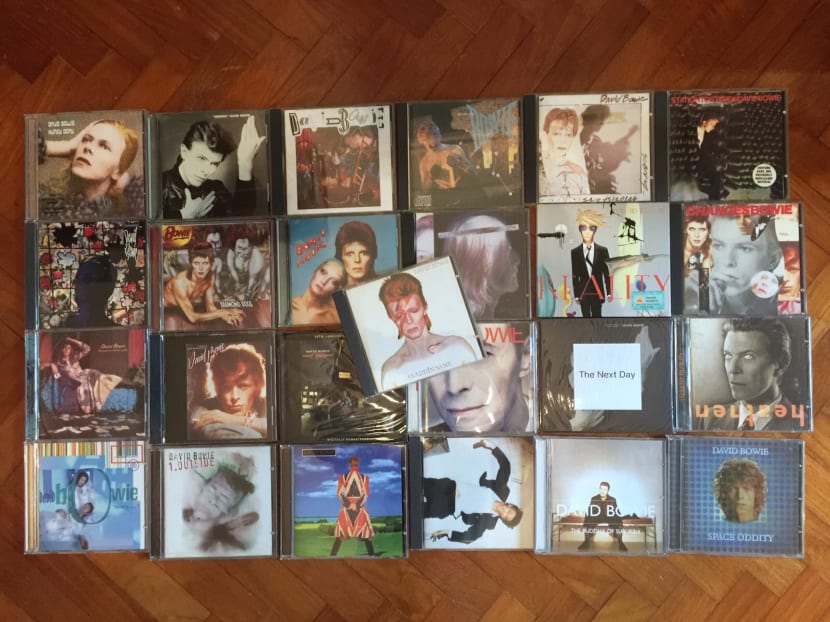A look back: Bowie's songs that please the ear
His life story – the public one, because Bowie has always been rather guarded about his personal life – has been fairly well told by the media and fans alike. But what really marked Bowie was his music.

From David Bowie to Blackstar: David Bowie's music also followed his changing image. Photo courtesy of Eddie Sung
SINGAPORE — As a teen, I used to watch this TV series which ran music videos. This was when MTV was still in its infancy, and my friends and I clamoured to watch the music videos of some of our favourite acts, which at the time were bands such as Duran Duran and Michael Jackson.
Then one day, they show this video which featured solarised images of four people walking in front of a bulldozar and a guy in a Pierrot costume singing, “ashes to ashes, fun to funky”. Unlike the other music videos of the day, which featured pretty girls, smart dressed guys and bright and shiny sets. This one was … weird.
That was my introduction to David Bowie.
And now, he has expired and gone to meet his maker. He rests in peace.
It’s hard to imagine someone who has gone through so much being, well, gone. His life story – the public one, because Bowie has always been rather guarded about his personal life – has been fairly well told by the media and fans alike. We all know about from his early days as Davy Jones, his dabbling with avant-garde theatre, his relationships with Hermione Farthingale, Angela Bowie and Iman, his various personas, and so on. But what really marked Bowie was his music. Changes wasn't just a song, or a mere descriptor of his image, it's also an apt adjective of his music.
But because it’s nearly impossible to ask a fan to come give a short list of Bowie’s greatest songs – here then, is a list of Bowie tracks that I believe encapsulate what a musician he really was. (You can leave your "why didn't you include this song" comments below.)
ASHES TO ASHES. Hands down, this was, musically, the best arranged Bowie song of the 1980s.
What’s not to like about the lovely rhythmic variations syncopated beats in the verse to the straight out rock and roll grooves. Then, there’s the equallyl delightful the key changes from minor to major and back again. And speaking of major, the lyrics on this one have given fans decades of “what was he talking about” discussions. There’s the cool recall of Major Tom from “such an early song” and all sorts of lyrical imagery (“the shrieking of nothing is killing me, just pictures of Jap girls in synthesis”) that seem to hint at Bowie’s drugged out state (“Time and again I tell myself, I’ll stay clean tonight”). I remember straining to pick out what he was saying behind the music during the pre-chorus (which apparently turned out to be “songs that please the ear and leave the mind alone … an outdated concept of falling”).
SOMETHING IN THE AIR. No, it’s not a cover of the Thunderclap Newman song.
This is off the 1999 album …hours, which has some of the best Bowie songs (most co-written with longtime Bowie collaborator Reeves Gabrels) of his latter era: There’s Survive, with delightful guitar work by the folky Seven; the grungy What’s Really Happening; the hard-hitting The Pretty Things Are Going To Hell; and the absolutely fabulous title track. But for my money, the piece de resistance is this one. It’s a biting musical retort that’s filled with loads of typical enigmatic lyrics (“lived with the best times, left with the worst”) that at first seems to delight in dwelling in a dark verses before it turns on the ignition and soars at full throttle in the chorus (with Bowie pulling that one anguished note towards the end). It was also used in American Psycho and Memento, arguably the two biggest cult movies of the era.
SPACE ODDITY. This was the “early song” (from 1969 – it is 47 years old!) that Bowie was talking about in Ashes To Ashes.
This was where he introduced the character of astronaut Major Tom and told the story of how he seemingly gets lost in space during a flight. Again, this one has lovely rhythmic transitions and minor-major key changes. It has since been used in various movies, one of the most recent being The Secret Life Of Walter Mitty, with Kirsten Wiig singing to Ben Stiller’s character.
LET’S DANCE. Sure, it’s as pop as Bowie gets. But it’s a great funk song (thanks to Nile Rodgers helming the production), that doesn’t put a foot wrong.
While it's an out-and-out pop number, it's also interesting that, coming after a decade of experimentation, going straight, as it were, was probably the most experimental thing he could have done at the time. It was a great dance song in the 1980s. It’s a great dance song now. And it has the first pop appearance of one of the greatest blues guitar players: Stevie Ray Vaughn.
UNDER PRESSURE. This was as much a Bowie song as it was a Queen song.
Reportedly written in one studio session where both Queen and Bowie happened to be recording, it has a punctuating John Deacon bass line that locks in with Roger Taylor’s drumming like magic; lovely guitar work from Brian May that shifts from ephemeral lilt to crunchy tones; and of course, the contrasting and yet complementary vocals from Bowie and Freddie Mercury. Perfect.
HALLO SPACEBOY (Pet Shop Boys remix). Some people call the 1990s David Bowie’s lost years (even with Nirvana’s endorsement!) and his albums were often met with critical disdain.
And the artistes he inspired … well, the students (Trent Reznor, Madonna) surpassed the master in many ways. But then in 1995, he came up with this gem, which, when put in the hands of the Pet Shop Boys became one heck of a dance track. (The PSB even threw in a little Space Oddity homage.) It was one of the few 1990s songs he kept in his set list after the turn of the millennium.
WILD IS THE WIND. His cover of this old jazz standard is more haunting than any of those that came before (Nina Simone, Johnny Mathis) and after (George Michael, Cat Powers).
It takes on a haunting new meaning that the other versions lack, and is perfect as the closer on the 1976 album, Station To Station
HEROES (album version). Musically, this doesn’t differ much from the single version of the song.
Well, except that, at six minutes, it is longer, with verses about the sour elements in a relationship (“You can be mean and I, I’ll drink all the time, but we’re lovers … and that is that”) that were omitted. These actually make the song a little darker, and the struggle of the protagonist a lot more painful, than the seemingly triumphant anthem that many people, who've only heard the single version, assume this song is.
MODERN LOVE. It’s loud, it’s colourful and brash.
Kicking off with Stevie Ray Vaughn’s “zwaaach” guitar, before Tony Thompsons big beats thump in, this was probably Bowie’s brightest and most glam song. But Bowie sings about knowing when to get things done, things terrifying him, having no religion and then not actually believing in modern love at all. Confusing? A little. But you can really groove to this tune.
AFRAID. Bowie has called this tune a “deeply questioning album” with lyrics focusing on dying and the degradation of humankind (the album hints a little at the Sep 11 attacks of 2001).
It's taken off Heathen, an album that, like ...hours, features a slew of songs that pack a punch: Whether it's the almost whimsical Slip Away, the angsty Slow Burn or the cool remakes of Pixies' Cactus and Neil Young's I've Been Waiting For You. But this song, with its insistent guitar chugging away, also shows that even in the new millennium, Bowie could still rock.
ABSOLUTE BEGINNERS. The title track off the soundtrack of the movie of the same name.
In the 1980s, David Bowie's passion could be seen in various forms - the video for Jazzin' For Blue Jean and the movies, Merry Christmas, Mr Lawrence, Labyrinth and Absolute Beginners. Although it's mean to keep with the vibe of the movie, which is set in the 1950s, this song bears much more resemblence to music put out by groups such as The Style Council, that fused old school instrumentation with New Wave music concepts.
HEART'S FILTHY LESSON. Taken from Outside, this song may have been Bowie borrowing from the Nine Inch Nails (it could easily sit in the latter's The Downward Spiral album), but once again, he shows how much he has changed since he was Ziggy Stardust.
This, despite the fact that, if you deconstruct the concept behind the song and its parent album (the video to this song is a reference to the then-new underground art craze, where body parts were considered as "art"), it really comes from the same mindset as Ziggy.
I CAN'T GIVE EVERYTHING AWAY. The last song on Bowie's last album, Blackstar.
With its various melodic lines, this is probably the most "straightforward" song on an album that saw the singer once again pushing the boundaries of music and experimentation. And like the album, it's almost unapologetic in that concept.








